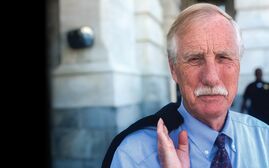Top Finnish official: Maine's forests are huge asset in emerging biobased economy
 Photo / Renee Cordes
Jaana Husu-Kallio, permanent secretary of Finland's Ministry of Agriculture and Forestry, delivers the keynote address this morning at Maine International Trade Center's Trade Day 2019 conference in Portland.
Photo / Renee Cordes
Jaana Husu-Kallio, permanent secretary of Finland's Ministry of Agriculture and Forestry, delivers the keynote address this morning at Maine International Trade Center's Trade Day 2019 conference in Portland.
Maine needs to tap the potential of its forests for new frontiers in business and innovation, a top government official from forest-rich Finland told hundreds gathered at the Maine International Trade Center's Trade Day 2019 event in Portland on Friday.
"The market is huge," said Jaana Husu-Kallio, permanent secretary of Finland's Ministry of Agriculture and Forestry.
She was speaking specifically about market opportunities for value-added, sustainable forest industry products, which her own country has begun to seize on, guided by a national strategy that's regularly updated.
Citing examples, Husu-Kallio said that men's underwear in Finland is already made from wood fiber, and that her dream is to one day have all her clothes made of Finnish wood fiber.
"I'm sure this is something to replace the synthetic material you cannot circulate," she said.
She also mentioned packaging materials, cosmetics and medicine as other value-added products that can be derived from forest resources, noting that the list of new products already available is "amazing."
"There are many that are in large-scale production. I'm extremely proud of that," she added.
As heavily forested areas, Maine and Finland are very similar. There are 17.6 million acres of forest land in Maine, of which 5.3 million acres or 30%, are owned by family woodland owners, largely in southern Maine, according to February 2019 data from the Maine Forest Service.
Finland has a growing stock of forests, 60% of which are owned by private individuals, according to Husu-Kallio.
Sharing an anecdote from her childhood home of Heinola, she said that three factories that had been forced to close are now all experiencing a rebirth of sorts, including a former paper mill that just reopened as a land-based aquaculture facility raising rainbow trout.
For a small town to now be leading innovation, she said, "come on, that's really great."
In an interview with Mainebiz on Thursday, she said the challenge for Maine and other places is to balance making money from sustainable forest products, and convincing customers that everything is produced in a sustainable way, with preserving nature.
Nearly 400 people from 10 countries had registered for Friday's conference, which also includes an industry panel discussion, a networking session with a new product showcase, and an awards luncheon with Maine Gov. Janet MIlls as the keynote speaker.
Wade Merritt, president of the Maine International Trade Center and state director of international trade, opened by saying that today's event "is not about tariffs and trade, but about the economic bedrock of our state and what lessons we can learn from the people who walked the path before us ... it's about working together with partners and friends to make it a better place."
Sen. Angus King, I-Maine, spoke of Maine's two assets of the forest and the ocean, and how those can be tapped for bio-based value-added products. Some are already being made today, like thin paper inside prescription packages, as well as scarves and "things that look like leather" being produced by Sappi North America.
"Now we're in an entirely new situation where the traditional value-added uses aren't enough." he said, noting that international competition, the strength of the U.S. dollar, tariffs and trade wars make it very complicated and challenging to compete effectively "with the rest of the world in commodities."













0 Comments